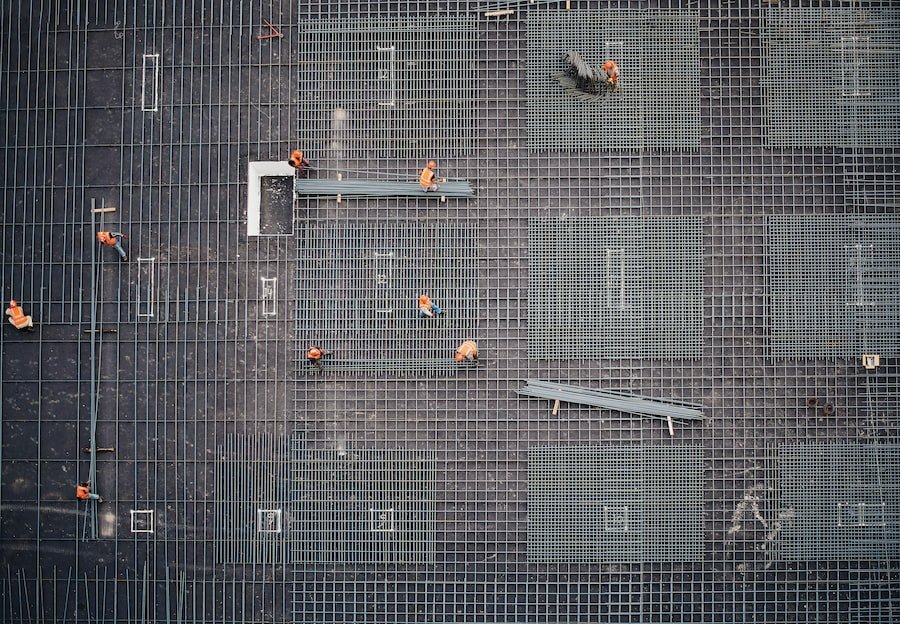

Construction and Trades: Understanding German Vocabulary on the Job Site
Learning German vocabulary in construction and trades is essential for professionals in these industries who work in German-speaking countries or with German-speaking clients. Having a strong command of the language allows for effective communication, collaboration, and understanding of the specific terminology used in these fields. Whether you are a construction worker, architect, plumber, electrician, or carpenter, knowing the relevant German vocabulary will greatly enhance your ability to perform your job effectively.
In construction and trades, there are various areas where German vocabulary is used. These include building design and architecture, plumbing and electrical work, carpentry and woodworking, project estimation and budgeting, construction site management and planning, as well as sustainable building and green construction practices. Each of these areas has its own set of specialized terms and phrases that are crucial for professionals to know in order to carry out their work successfully.
Table of Contents
ToggleBasic German Phrases for Communication on the Job Site
When working on a job site, effective communication is key to ensuring that tasks are carried out correctly and efficiently. Here are some basic German phrases that can be useful for communication on the job site:
Greetings and introductions:
– Guten Morgen/Tag/Abend (Good morning/day/evening)
– Wie geht es Ihnen? (How are you?)
– Mein Name ist… (My name is…)
– Ich bin hier, um zu arbeiten. (I am here to work.)
Asking for directions and instructions:
– Wo ist…? (Where is…?)
– Können Sie mir bitte helfen? (Can you please help me?)
– Was soll ich als Nächstes tun? (What should I do next?)
– Wie funktioniert das? (How does this work?)
Giving and receiving feedback:
– Das sieht gut aus! (That looks good!)
– Ich denke, wir sollten das anders machen. (I think we should do it differently.)
– Danke für deine Hilfe. (Thank you for your help.)
– Kannst du mir bitte Feedback geben? (Can you please give me feedback?)
Common phrases for teamwork and collaboration:
– Lass uns zusammenarbeiten. (Let’s work together.)
– Wir müssen effizienter arbeiten. (We need to work more efficiently.)
– Ich schätze deine Arbeit. (I appreciate your work.)
– Lasst uns eine Besprechung abhalten. (Let’s have a meeting.)
Common German Terms for Construction Materials and Tools
In construction and trades, it is important to be familiar with the names of different construction materials and tools. Here are some common German terms for construction materials:
– Beton (concrete)
– Ziegel (brick)
– Holz (wood)
– Stahl (steel)
– Glas (glass)
– Dachziegel (roof tile)
– Fliesen (tiles)
– Gipskartonplatte (drywall)
Similarly, knowing the names of common tools and equipment used in construction and trades is essential. Here are some examples:
– Hammer (hammer)
– Schraubenzieher (screwdriver)
– Säge (saw)
– Bohrer (drill)
– Zange (pliers)
– Schrauben (screws)
– Nägel (nails)
– Leiter (ladder)
Understanding German labels and instructions on materials and tools is also crucial. Paying attention to safety warnings, usage instructions, and maintenance guidelines can prevent accidents and ensure the longevity of the materials and tools being used.
Understanding German Safety Regulations in Construction and Trades
Safety is of utmost importance in construction and trades, and understanding German safety regulations is essential for professionals in these industries. Here is an overview of some common safety terms and phrases in German:
– Sicherheit (safety)
– Gefahr (danger)
– Vorsicht (caution)
– Schutzkleidung (protective clothing)
– Notausgang (emergency exit)
– Feuerlöscher (fire extinguisher)
– Erste Hilfe (first aid)
– Sicherheitsausrüstung (safety equipment)
In addition to knowing the safety terms, it is important to understand safety signs and symbols in German. These signs and symbols provide important information about potential hazards, emergency procedures, and safety precautions. Familiarize yourself with these signs and symbols to ensure a safe working environment.
German Vocabulary for Building Design and Architecture
For professionals in building design and architecture, having a strong command of German vocabulary is crucial. Here are some common terms related to building design and architecture:
– Gebäude (building)
– Struktur (structure)
– Fundament (foundation)
– Fassade (facade)
– Dach (roof)
– Fenster (window)
– Tür (door)
– Treppenhaus (staircase)
In addition to these basic terms, it is important to know the names of architectural features and elements. These include:
– Säule (column)
– Bogen (arch)
– Balkon (balcony)
– Veranda (porch)
– Giebel (gable)
– Kuppel (dome)
– Pfeiler (pillar)
Understanding German blueprints and plans is also essential for professionals in building design and architecture. Being able to interpret floor plans, elevations, sections, and other architectural drawings will greatly enhance your ability to carry out your work effectively.
German Terminology for Plumbing and Electrical Work

Professionals in plumbing and electrical work also need to be familiar with German vocabulary specific to their fields. Here are some common terms related to plumbing:
– Wasserleitung (water pipe)
– Abflussrohr (drain pipe)
– Wasserhahn (tap/faucet)
– Toilette (toilet)
– Spüle (sink)
– Dusche (shower)
– Heizung (heating system)
– Boiler (boiler)
Similarly, here are some common terms related to electrical work:
– Stromleitung (power cable)
– Steckdose (socket/outlet)
– Schalter (switch)
– Sicherungskasten (fuse box)
– Glühbirne (light bulb)
– Kabel (cable/wire)
– Verteilerkasten (distribution box)
Understanding German manuals and instructions for plumbing and electrical work is also important. These manuals provide information about installation, maintenance, and troubleshooting procedures.
German Words for Construction Site Management and Planning
Construction site management and planning require a specific set of skills and knowledge. Here are some common terms related to construction site management:
– Baustelle (construction site)
– Bauleiter (construction site manager)
– Vorarbeiter (foreman/supervisor)
– Bauarbeiter (construction worker)
– Kran (crane)
– Bagger (excavator)
– Gerüst (scaffold)
– Bauplan (construction plan)
In addition to these terms, it is important to know the names of common construction site equipment and machinery. These include:
– Betonmischer (concrete mixer)
– Schubkarre (wheelbarrow)
– Schaufel (shovel)
– Presslufthammer (jackhammer)
– Sägebock (sawhorse)
Understanding German construction site plans and schedules is also crucial for effective project management. Being able to interpret these plans and schedules will help ensure that tasks are carried out in a timely manner.
German Vocabulary for Carpentry and Woodworking
Professionals in carpentry and woodworking also need to be familiar with German vocabulary specific to their fields. Here are some common terms related to carpentry:
– Holzbrett (wooden board)
– Säge (saw)
– Hobel (plane)
– Schraubzwinge (clamp)
– Schleifpapier (sandpaper)
– Leim (glue)
– Nagel (nail)
– Schraube (screw)
In addition to these terms, it is important to know the names of common carpentry and woodworking tools. These include:
– Hammer (hammer)
– Meißel (chisel)
– Zange (pliers)
– Schraubenzieher (screwdriver)
– Gehrungssäge (miter saw)
Understanding German instructions and plans for carpentry and woodworking projects is also important. These instructions and plans provide information about measurements, assembly procedures, and finishing techniques.
Construction and Trades Terminology for Project Estimation and Budgeting
Project estimation and budgeting are crucial aspects of construction and trades. Here are some common terms related to project estimation and budgeting:
– Projekt (project)
– Kostenschätzung (cost estimation)
– Budget (budget)
– Materialkosten (material costs)
– Arbeitskosten (labor costs)
– Zeitplan (schedule)
– Ressourcen (resources)
– Gewinnmarge (profit margin)
In addition to these terms, it is important to know the names of common project management tools and techniques. These include:
– Gantt-Diagramm (Gantt chart)
– Netzplandiagramm (network diagram)
– Risikoanalyse (risk analysis)
– Meilenstein (milestone)
Understanding German project estimates and budgets will help ensure that projects are completed within the allocated resources and timeframes.
German Words for Sustainable Building and Green Construction Practices
With the increasing focus on sustainability and green construction practices, it is important for professionals in construction and trades to be familiar with German vocabulary related to these areas. Here are some common terms related to sustainable building practices:
– Nachhaltiges Bauen (sustainable building)
– Energieeffizienz (energy efficiency)
– Erneuerbare Energien (renewable energy)
– Gründach (green roof)
– Regenwassernutzung (rainwater harvesting)
– Wärmedämmung (thermal insulation)
– Solarenergie (solar energy)
– Passivhaus (passive house)
In addition to these terms, it is important to know the names of common green construction materials and technologies. These include:
– Photovoltaik (photovoltaic)
– Solarthermie (solar thermal)
– Wärmepumpe (heat pump)
– LED-Beleuchtung (LED lighting)
– Recyclingmaterialien (recycled materials)
Understanding German regulations and certifications for sustainable building will help ensure that projects meet the required standards and contribute to a more sustainable future.
Conclusion:
Learning German vocabulary in construction and trades is essential for professionals in these industries. It allows for effective communication, collaboration, and understanding of the specific terminology used in these fields. Whether you are a construction worker, architect, plumber, electrician, or carpenter, knowing the relevant German vocabulary will greatly enhance your ability to perform your job effectively.
In this article, we have covered various areas where German vocabulary is used in construction and trades. From basic phrases for communication on the job site to specific terminology for different materials, tools, safety regulations, building design and architecture, plumbing and electrical work, construction site management and planning, carpentry and woodworking, project estimation and budgeting, as well as sustainable building and green construction practices.
By familiarizing yourself with these terms and phrases, you will be better equipped to navigate the German-speaking construction and trades industry. Remember to continue learning and practicing German vocabulary in the field to further enhance your skills and knowledge.
If you want to learn German, you can register for classes here. We look forward to hearing from you and helping you become fluent in German!
If you want to learn Norwegian, you can register for classes here. We look forward to hearing from you and helping you become fluent in Norwegian.





